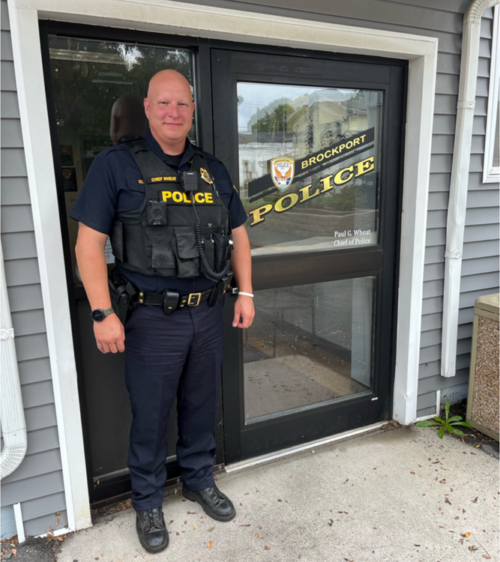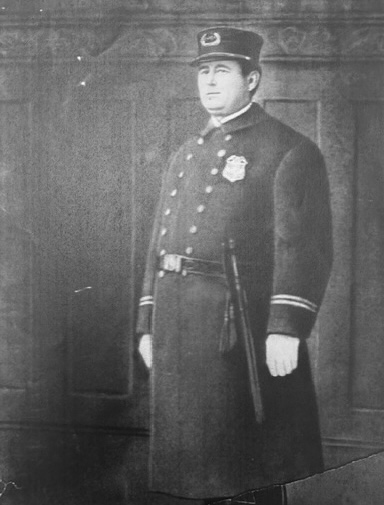Profiles in policing: Paul Wheat, Brockport’s new Chief of Police
An occasional series focusing on the officers of the Brockport PD, their jobs, their stories, and their thoughts on policing.

by Margay Blackman,
Brockport Village Mayor
In 1897 the Village of Brockport formalized the police department, appointing Giles Hoyt the first Chief. Hoyt served in the position for 43 years, retiring in 1940.
Recently, I sat down with Chief Paul Wheat to interview him about his journey into policing and his new position as Brockport’s tenth police Chief.
The appeal of policing came to Paul early in life. As a student at Brockport’s Nativity BVM school, he daydreamed about being on call for police jobs. The allure of policing followed him into his teen years. Directly across from the Wheat family home on Holley Street was a student rental, where the police were regularly summoned for noise and other village ordinance violations. Paul’s bedroom window offered an unobstructed view of the rental house and a front-row seat to late-night Brockport police activity, which he took full advantage of.
His police interest stoked by his late-night observations, Paul signed up at Brockport High School for an MCC program called “New Visions,” a precursor to the popular SUNY Brockport 3-1-3 program that offers college credit to high school students. The New Visions program offered two tracks at MCC: law enforcement and medicine. Not surprisingly, Paul chose law enforcement. His coursework included an internship with the Rochester Police Department (RPD), followed by an internship with the Brockport Police Department (BPD). At the BPD, he mapped auto accidents and did a lot of ride-alongs. Working with Chief Gary Zimmer, Paul said he found the BPD command staff more hands-on than the RPD.
His biggest takeaway from the New Visions program was not to major in criminal justice in college; you’ll learn policing through the police academy. Nonetheless, at SUNY Oswego, he ended up majoring in Public Justice (aka Criminal Justice). He started as a business major but lamented, “I did a lot just to get B’s,” so after taking a couple of public justice courses, he switched his major. He graduated from Oswego in 2000, where, for four years, he also pursued his second love, playing on the baseball team.
In 2001, Paul was hired by Brockport Police Chief Gary Zimmer as a part-time police officer. He was 23 and joined several other part-timers working 8 to 4. “It was fun,” he remembered. “I was excited to come to work.” In June of 2003, Paul joined the department full-time, working afternoons. But at the first opportunity, he switched to nights, which he enjoyed so much that he spent 17 years as a night cop. “I never thought I’d be a day officer,” he said. Nor did he ever think he would be Chief of the department. “I thought I’d be an officer, work for 20 years, retire, and do something else.” Nonetheless, he seems to have slipped seamlessly into a position that quite agrees with him.
Paul became a Sergeant in 2013, and Chief Cuzzupoli appointed him Lieutenant upon the retirement of Lt. Steve Mesiti in 2021. On June 14 of this year, as Cuzzupoli retired, Paul became chief.
There are advantages to being a police chief as a local. Paul reflected, “The village, the town, and the people here are my home. As a 23-year-old police officer, I was dealing with my friends, and it was sometimes awkward. But, if need be, I could go to those same people for information. Going to a domestic call of someone you know is difficult,” he added. “And I have written tickets to the parents of my friends.” Paul was raised in Brockport and his parents were prominent in the community. His father was a vice principal at the high school, a Village Board trustee, and later a Town of Sweden councilman; his mother was a nurse and community volunteer.
Today, Paul, his wife, and three children live on acreage outside the village but often come as a family with their bikes to ride the canal path and stop and visit Brockport’s parks. A certified bicycle policeman, Paul extolls Brockport’s bike-ability and its parks.
He agrees with Cuzzupoli’s approach to leadership—be both teacher and coach – and that community policing, with police feet on the street, is the department’s direction. Paul has ideas for expanding community policing: more activity in the parks with the police – pickleball, for example, a community bike ride or kayaking on the canal; casual events that foster an authentic connection between the police and Brockport community members.
Coffee with the Chief, started by Chief Cuzzupoli, continues on the first Wednesday morning of every month. September’s gathering included Village Board members, clergy, village employees, Wegmans representatives, and the Chief’s mother, Sharon Wheat, who was there to talk about putting services for community members in need under one roof. At one point, she turned to Paul to get his attention. “Son,” she began. He turned to her with a wicked grin, “That’s Chief.” Later, he remarked, “People used to ask me, ‘Are you Sharon Wheat’s son?’ Now they ask, ‘Are you the Chief?’”
As Chief, Paul is on the road only occasionally, filling in at the last minute for an officer who is out sick, injured, or on vacation. Lt. Korn, newly appointed by Paul to his position, commented, “Few Chiefs do what Chief Wheat does, working a shift to allow an officer time off and avoiding paying someone overtime.” Thus, we sat in the Chief’s office, not his car, for our interviews. The long pale blue wall behind his desk is still blank, but Paul has a plan to fill it. He approached the Brockport Museum of Local History about getting some historic photos of the BPD and its personnel which could be enlarged and framed. The one framed police-themed piece, a medal of merit award from the New York State Assembly, hangs on a side wall. Paul and two other Brockport police received it in 2006 for apprehending a suspect in an attempted bank robbery at Chase Bank.

The Chief’s job itself is primarily managerial/administrative. Paul oversees and supervises a department of 13 Police Officers and a clerk. He is in charge of the department’s General Orders, its policies and procedures, the budget, and the very organization of the BPD. Some of it is mundane, but ultimately, the Chief sets the tone for the BPD. He speaks to the public and the press and regularly meets with the Monroe County Association of Police Chiefs and the Law Enforcement Council. His name, at the top of the departmental letterhead, underscores his responsibility. As mayor, I can empathize.
In closing, I asked Chief Wheat two questions: What’s the biggest challenge for the BPD? He responded, “I’m blessed to have a group of wonderful officers and a top-notch command staff. My predecessors have set me and this department up for continued success. Currently, our biggest challenge is the same as that of departments across the state and the country – staffing. Twenty-four years ago, thousands of people were applying for police jobs. If you were offered a job, even part-time, you took it. Today, we struggle to find qualified candidates, and those candidates can choose which department they work for. “
And, the most rewarding part of the job? “Since we are a small department, I am still very involved with my officers and the community. We have a chain of command, but I still get to interact with my officers and be involved daily in actual police work. I still go on calls for service and can hopefully make a positive difference in the lives of people I interact with. Being able to help our citizens and my department members is the most rewarding part of being Chief.”
After three months, Paul says he’s still learning. “If you think you know it all, it’s time to retire.”





